When planning a 12-day Annapurna Circuit Trek, whether from Pokhara or Kathmandu, one can expect a remarkable blend of natural beauty and cultural richness. The trek takes adventurers through diverse landscapes, past ancient monasteries, and into the heart of local traditions. Crossing the Thorong La Pass is a highlight, but it’s the interactions with village communities that often leave a lasting impression. As trekkers prepare for this journey, they might wonder about the best times to go or how to stay safe in the mountains, which are crucial considerations that can make or break the experience.
Key Points
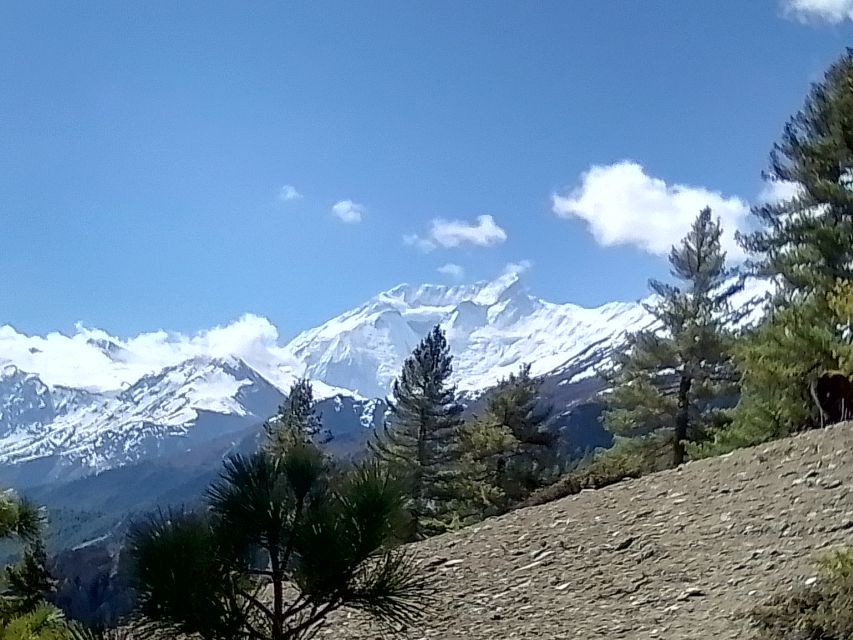
- The 12-day Annapurna Circuit Trek starts from either Pokhara or Kathmandu, providing stunning mountain views and diverse landscapes.
- The trek includes crossing the Thorong La Pass at 5,416 meters, offering breathtaking vistas of snow-capped peaks.
- Cultural immersion includes visiting traditional villages, ancient monasteries, and participating in local rituals.
- The total price of $766.53 per person covers accommodations, expert guides, and essential permits.
- Optimal trekking seasons are spring (March to May) and autumn (September to November) for mild weather and fewer crowds.
It's also worth checking out some other tours and experiences nearby.
Trek Overview and Highlights
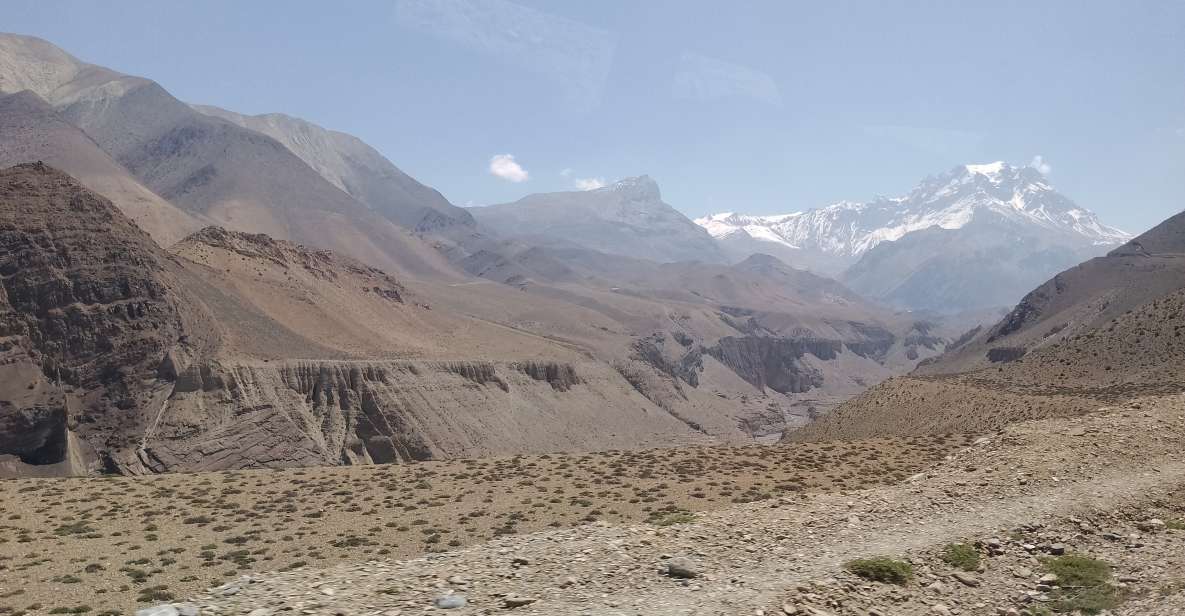
The Annapurna Circuit Trek, typically spanning 12 days, offers adventurers an unforgettable journey through stunning landscapes and rich cultural experiences, starting from either Pokhara or Kathmandu.
Priced from $766.53 per person, this trek includes a live tour guide fluent in English, Hindi, and Nepali to enhance the experience.
One of the highlights is crossing the Thorong La Pass at 5,416 meters, which presents breathtaking views of snow-capped peaks.
Along the way, trekkers can enjoy Tibetan culture, visit ancient monasteries, and enjoy natural hot springs.
The trek also takes you to the Muktinath pilgrimage site, making it a spiritually enriching experience.
Plus, with free cancellations up to 24 hours in advance, planning is stress-free!
Trekking Experience and Cultural Immersion
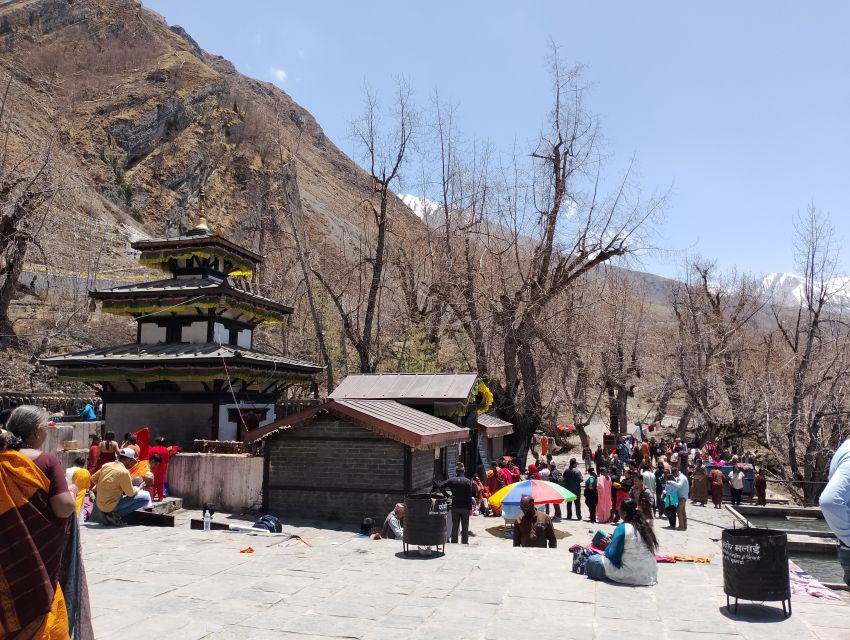
Trekking through the Annapurna Circuit unveils a tapestry of diverse landscapes, from lush valleys and cascading waterfalls to dense forests and towering snow-capped mountains. Adventurers encounter traditional villages inhabited by the Gurungs, Thakalis, and Manangis, each offering a glimpse into unique cultures and lifestyles. Interacting with locals and visiting ancient monasteries enriches the experience, allowing trekkers to appreciate the region’s rich heritage.
Here’s a handy table summarizing some cultural highlights:
| Cultural Aspect | Description | Interaction Opportunities |
|---|---|---|
| Traditional Villages | Explore Gurung and Thakali villages | Engage with locals |
| Ancient Monasteries | Visit sacred sites | Participate in rituals |
| Local Cuisine | Taste authentic dishes | Dine with families |
| Festivals | Experience local celebrations | Join in the festivities |
| Tibetan Culture | Learn about Tibetan Buddhism | Visit monasteries |
Detailed Itinerary of the Trek
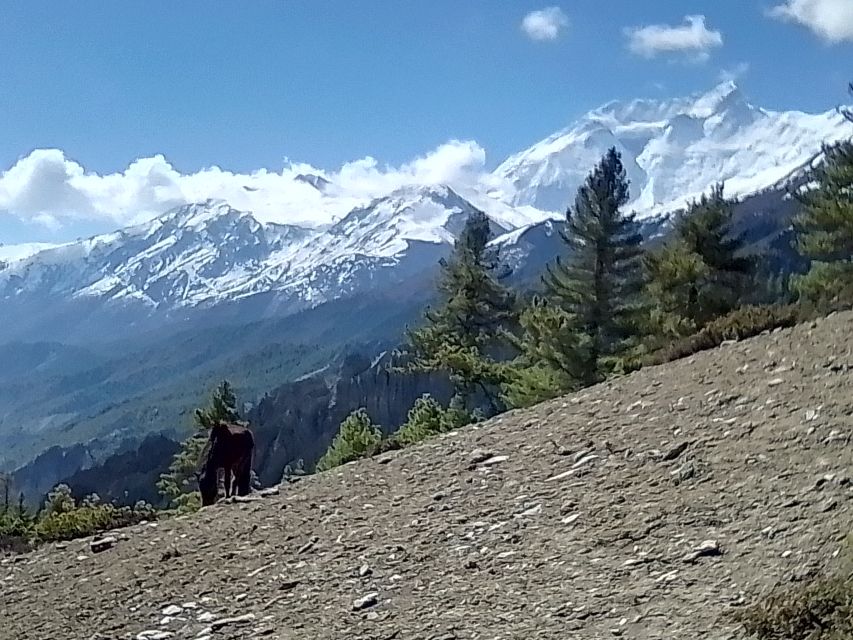
Exploring the Annapurna Circuit unfolds a carefully crafted itinerary that guides trekkers through stunning landscapes and cultural encounters over 12 days.
Starting with a drive to Besisahar, the trek progresses through charming villages like Bahundanda and Chamje, introducing trekkers to local cultures.
As they ascend, the trek continues to higher altitudes, reaching Manang, where an acclimatization day allows for exploration of the vibrant town.
The adventure intensifies with the crossing of Thorong La Pass, rewarding trekkers with unparalleled views.
Finally, they descend to Muktinath and conclude in Jomsom, where a flight back to Pokhara awaits.
Each day is packed with breathtaking scenery and rich cultural experiences, making this trek an unforgettable journey.
Essential Inclusions and Services
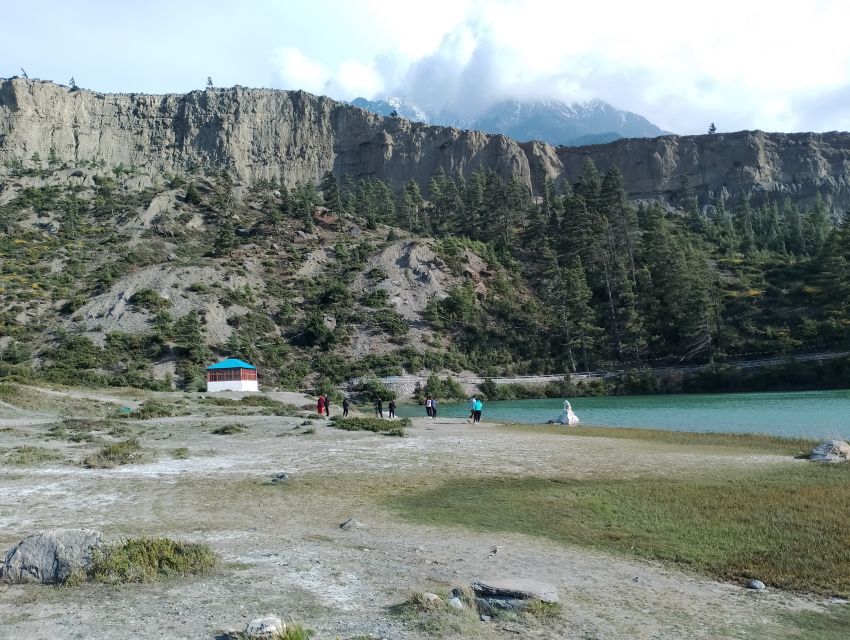
Essential inclusions and services ensure trekkers have a hassle-free experience, from hotel pickups to professional guides and necessary permits. This thoughtful planning allows adventurers to focus on the incredible landscapes and vibrant cultures along the Annapurna Circuit.
Here are four key inclusions:
-
Transportation: A convenient bus ticket from Kathmandu or Pokhara to Besisahar, plus hotel pickups and drop-offs.
-
Expert Guidance: A professional English-speaking trekking guide who knows the terrain and local culture.
-
Accommodation: Comfortable guesthouse stays during the trek, providing a cozy retreat after a day of exploration.
-
Safety Essentials: A trekking permit, emergency first aid kit, and the guide’s insurance for peace of mind.
These services enhance the trekking experience, allowing trekkers to fully enjoy the adventure.
Tips for Preparation
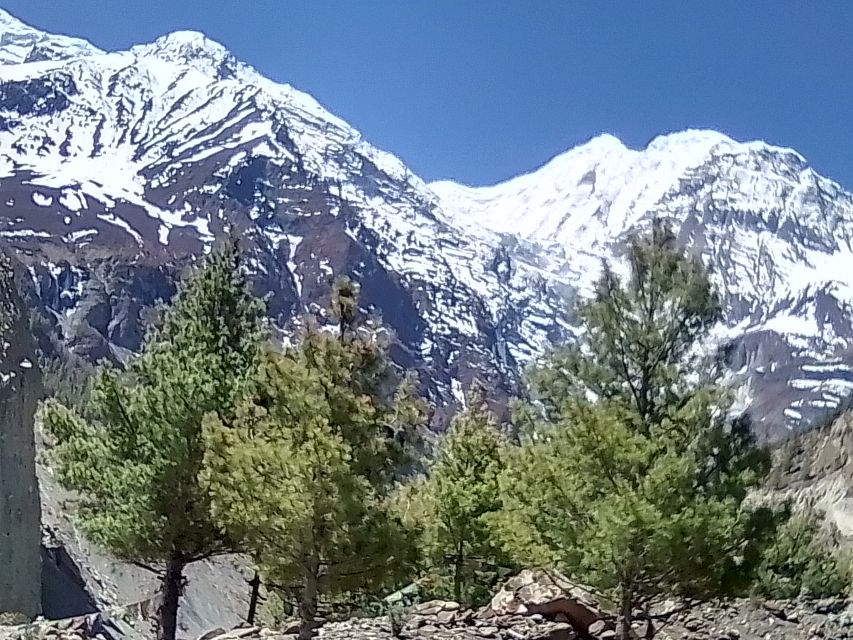
Preparing for the Annapurna Circuit Trek involves careful planning and a few key considerations to ensure a smooth and enjoyable journey.
First, trekkers should invest in good-quality gear, including sturdy hiking boots and a reliable backpack.
Staying physically fit is crucial, so regular hikes or cardio workouts can help build endurance.
It’s also wise to learn a few basic Nepali phrases—locals appreciate the effort and it enriches the experience.
Hydration is key, so carrying a reusable water bottle and water purification tablets is a smart move.
Lastly, understanding local customs and showing respect for cultural sites can enhance interactions with the friendly communities along the trail.
Embracing the journey with an open mind makes all the difference!
Best Time to Trek
The best time to trek the Annapurna Circuit is during the spring (March to May) and autumn (September to November) when the weather is generally stable, offering clear skies and breathtaking views of the majestic peaks.
Here are four key reasons why these seasons shine:
-
Perfect Weather: Expect mild temperatures and low chances of rain.
-
Stunning Scenery: Wildflowers bloom in spring, while autumn offers vibrant foliage.
-
Cultural Festivals: Experience local festivals like Dashain and Tihar during the fall.
-
Fewer Crowds: While it can be busy, these months often see fewer trekkers than peak summer.
With the right timing, trekkers can truly appreciate the beauty and culture the Annapurna Circuit has to offer.
Safety and Health Considerations
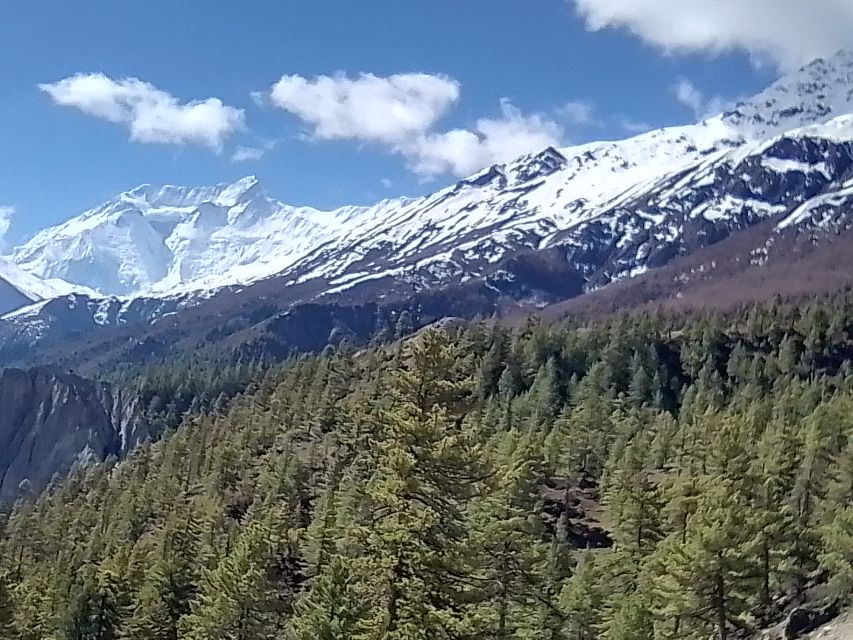
Trekking the Annapurna Circuit demands attention to safety and health, as altitude sickness and unpredictable weather can pose challenges for adventurers.
It’s crucial for trekkers to acclimatize properly, especially when reaching higher altitudes. Staying hydrated and consuming high-carb meals can help mitigate altitude effects. Monitoring one’s physical condition is vital; if symptoms of altitude sickness arise, descending to a lower altitude immediately is essential.
Weather can change rapidly, so dressing in layers and carrying waterproof gear is a smart move. On top of that, trekkers should always have travel insurance that covers emergency rescues.
Engaging with local guides not only enhances safety but also provides cultural insights, enriching the overall trekking experience. Prioritizing health and safety ensures a memorable and enjoyable adventure.
How to Book Your Trek
Booking your Annapurna Circuit trek is as simple as reaching out to a reliable tour operator or travel agency that specializes in Nepalese adventures. To make the process seamless, here are four practical steps to follow:
-
Research: Look for operators with great reviews and a solid safety record.
-
Inquire: Contact them to ask about itineraries, prices, and group sizes.
-
Compare: Weigh your options based on inclusions, such as guides and accommodation.
-
Confirm: Once you’ve chosen, book your trek and ensure you understand the cancellation policy.
Here's a few more nearby tours and experiences we think you'll like.
Frequently Asked Questions
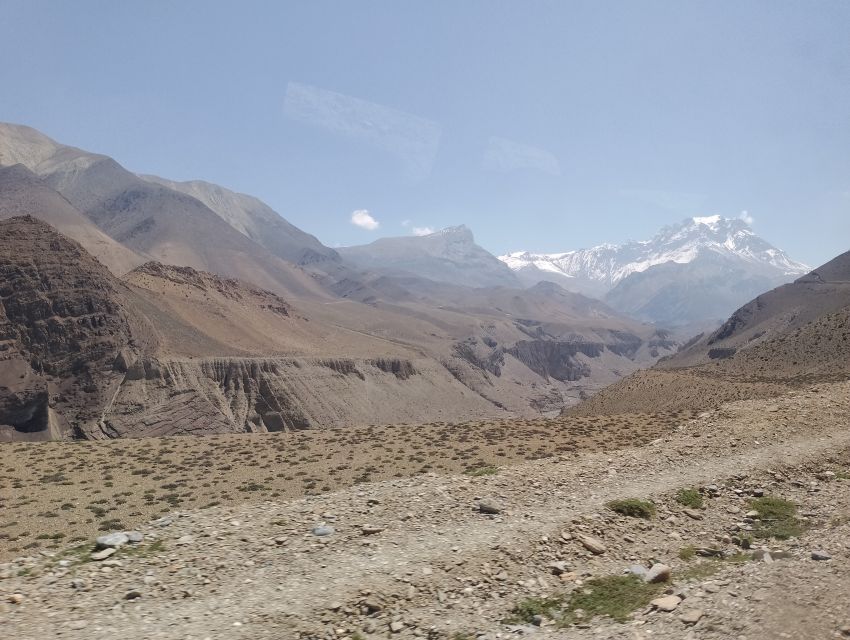
What Physical Fitness Level Is Required for the Trek?
For the trek, a moderate fitness level’s required. Regular hiking practice helps. It’s crucial to acclimatize to high altitudes, so staying active beforehand ensures a more enjoyable experience while taking in the stunning surroundings.
Are There Age Restrictions for Participants on the Trek?
There aren’t strict age restrictions for the trek, but participants should be reasonably fit. Many older trekkers enjoy the experience, embracing the stunning landscapes and vibrant cultures along the way. It’s all about preparation and determination!
What Type of Accommodation Can I Expect During the Trek?
During the trek, participants can expect cozy guesthouses offering basic amenities. They’ll experience local culture, enjoy hearty meals, and connect with fellow trekkers, creating memorable moments amid stunning landscapes and vibrant communities.
Can I Hire Additional Porters for My Luggage?
Yes, they can hire additional porters for their luggage during the trek. This allows trekkers to focus on enjoying the stunning landscapes and cultural experiences without the burden of heavy packs. It’s a common practice.
Is There Wi-Fi or Mobile Service Available Along the Trek?
They often find limited Wi-Fi and mobile service along the trek. Villages may offer connectivity, but it can be spotty. It’s best to enjoy the experience and disconnect from technology while immersing in the stunning surroundings.
Not for you? Here's more of our most recent tour reviews happening neaby
- 3DAYS 4WD Private Jeep Drive to Mustang-Jomsom/Muktinath From Pokhara
- 2 Days Australian Camp Trek From Pokhara
- Paragliding in Pokhara
- 5 Days Mardi Himal Base Camp Trek
- Hiking to World Peace Stupa via Foxing Hill to Expose Rural Area
- Lower Seti Friendly Family Trip (2 Day 1 Night)
- Annapurna: Mardi Himal Base Camp Trek
- Upper Seti Half Day Rafting From Pokhara
- 4-Day Private Trekking Experience To Poon Hill and Ghandruk
- 4 Days Amazing Poonhill Trek From Pokhara
- Exclusive Mountain View Scenic Drive
- Pokhara: Hot Air Ballooning in Pokhara, Nepal
- Day Long Hiking From Sarangkot to World Peace Stupa
- Entire Pokhara City Tour by Private Car
- One Day Easy Hiking From Pokhara
Recap
To sum it up, the Annapurna Circuit Trek offers an incredible blend of adventure and cultural richness.
Whether you’re soaking in the views at Thorong La Pass or sharing stories with locals, each step is a unique experience.
With careful planning and the right mindset, trekkers can truly embrace the beauty and traditions of this stunning region.
So, lace up those hiking boots and get ready for an unforgettable journey through the heart of the Himalayas!
